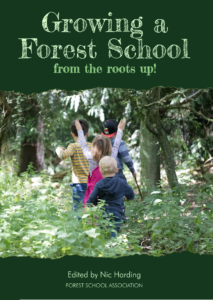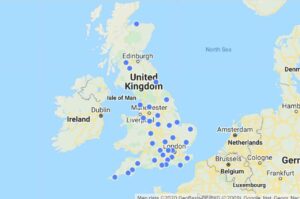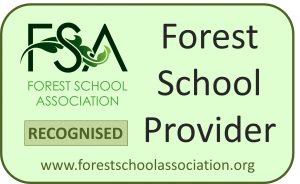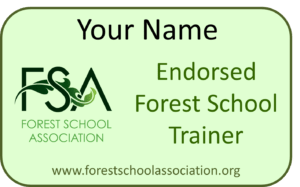FSA Webinar Wednesday – Reflective Practice, 27th May 2020, 8-9.30pm
Summary & Collated Notes
Topic: Reflective Practice: Creating balance in our own professional learning practice.
Speaker: Caylin Gans: Caylin’s website is www.ForestSchooled.com, and her blog resulted in ‘Forest Schooled – The Book’, published in 2019 and a must-read for all budding and flourishing Forest School leaders. She has established and run Forest School in several countries and now works as a consultant and mentor in Canada.
Webinar Style: ‘Around the Hearth – Discussion & sharing
Total Number Registered: 140
Total Number attended: At 8pm: 77, up to maximum 81 average 78. Break out rooms (8.40pm) dropped down to 63.
Please see webinar recording for full Discussion. Please be aware that Break out rooms are not recorded but we compile notes from what people share
- Welcome from Chairperson (Jon),
- Update from the FSA (Jon):
- IOL ‘Turning Learning Inside Out’ campaign – https://www.outdoor-learning.org/News/Latest-News/turning-learning-inside-out-supporting-schools-to-re-open-by-taking-learning-outdoors-1
- FSA is considering offering an online conference in Jan/Feb 2021
- FSA considering the possibility of doing an online conference
- Latest FSA update relating to Covid – 19 https://forestschoolassociation.org/ncorona-covid-19-and-forest-school/
- FSA Forest School presentation – https://youtu.be/L3mqjtevkQc
- Housekeeping and Zoom etiquette (Nic)
- Intro to this webinars topic & Welcome to Caylin (Jon)
- Jon asked Caylin some questions:
‘What made you write this so openly and honestly?’
- Caylin explained about her background and how her writing stemmed from keeping her learning journal during FS training.
- Wanting to connect more deeply with children she was working with, in a pupil referral unit.
‘How have things changed for you since this reflective practice – internally and externally as a practitioner?’
- Links with other ideas that are already out there.
- Caylin shared some slides – Connections with other learning theories, learning preferences, the importance of balance between active and reflective methods. You can find Caylin’s slides here>
- Reflection as vulnerability.
- Brene Brown – The Power of Vulnerability TED talk www.ted.com/talks/brene_brown_the_power_of_vulnerability?language=en
‘What is the role of vulnerability in our practice?’
- Importance of acknowledging own emotions & model this with groups
- Becomes easier the more you do it
- Split into break out rooms in small groups to discuss and share the questions:
- What can reflection look like?
- What barriers might we face in practicing reflection?
- What could help us overcome barriers and integrate reflection into our practice?
Compilation of notes from break out rooms:
- What can reflection look like?
- Journaling, blogs, mental reflection
- Discussion about ‘can you be honest if others are reading it’
- Self connection is really important, being really in tune with our own feelings We reflect alongside with the participants and be honest about our own accomplishments and frustrations Reflections in front of a senior leader felt strange ‘out of context’ when it wasn’t in the woods. Writing notes Photos
- Reflection is who we are not what we do…that is the place we want to be.
- One idea that stood out for us was Spontaneous Reflection, rather than forced. More natural and child-led rather than the adult-led ‘everyone say something they’ve enjoyed today’ approach!
- diff kids reflect in diff ways at diff times
- I work in both a school and as a freelancer and reflection is radically different. I find it more effective as a freelancer as it is fully embedded into my practise across all areas connected to running Forest School. However, sometimes I feel that in a school context, only lip service is paid to it and it becomes a box ticking exercise, namely ‘pupil voice’ which generally happens once a term! If the children are the centre of the learning, it needs to be happening consistently and be embedded into the FS sessions.
- Difficult to think positively. -Discussed expectations on whole thing on one part. – useful for learning journey.
- we discussed how reflection is the process rather than the product so does not need to be a physical thing- thinking in the car journey home, whilst exercising etc is still a reflection. also not one size fits everyone- diff methods for diff people. barriers- time in school environment difficult to find, building into routine helps, it’s like a muscle that gets stronger as exercised. the culture in the workplace could be either positive or negative for good reflective practice
- Sometimes 1:1 with a trusted colleague. More personal reflection recently in lockdown.
- With children in plenary at the end of a session.
- Constant part of the process – at the forefront of the mind. Not using props (pens/charts etc any more but relying on judgement and constant reflection. Long type up at the end of a session, with a bit of reflection for oneself.
- Doesn’t come naturally. Easier as part of a discussion. Pick up things from discussion to talk about more. Talk about the experience. Recognise being quiet is a part of discussion.
- Be open, be honest. Listen to others.
- Doing is good, easier to learn for us.
- Can be hard to do, you can be hard on yourself.
- Can also be liberating – putting things into perspective.
- Methods used –
- Try 5 finger reflection – what did you like, what would you show someone else etc
- Roll a cube of wood – 6 words on the sides of the dice.
- Pass a knotted rope around group. Where the knots stop the children are asked to reflect.
- What barriers might we face in practicing reflection?
- Honesty, perspective
- When working with children – hard not to take on their emotions – overwhelm
- We can only experience things through our own perception, experiences etc Our reality is only true to us, not necessarily true for others
- Time necessary to reflect, difficult if very busy.
- Familiarity (space, surroundings) can lead to less mindfulness
- Time in a session is sparing Difficult to process sometimes w children and reflect immediately Own personal time Not feeling safe Limited contact, week in between sessions
- Nice distractions sometime stop the process halfway through
- Expectation to who will read reflections. – self criticism – looking for perfections. Overcome/ Integrate – talk to others as a team/ with a mentor. – role model to group (Individual/ group)
- Outcomes based education system, reflections about children are sometimes the product – therefore take precedent.
- One can become fixed on tools and skills improvement rather than self understanding.
- Lack of time, combined with lack of priority.
- Share with children and show vulnerability.
- time (packing up, onto the next sessions, back to family time), thinking just the children need to reflect, not wanting to bare that vulnerability)
- Fear
- Lack of confidence
- Time
- Managing the outcomes with some groups.
- What could help us overcome barriers and integrate reflection into our practice?
- Sharing, talking it out, write it down
- Acknowledging all feelings, benefits of mindfulness
- Different perceptions
- Practice reflection ‘outside’ of the circle more Make it more normal, practice it often, make people feel more relaxed. Try to stick to long programs Safe environment, practice non judgement
- talk to others as a team/ with a mentor. – role model to group (Individual/ group)
- communicate to everyone on board that reflection is needed
- Capturing reflection when it happens naturally, not forcing it
- in our group we were talking about factoring in reflection within daily routines
- Active listening
- Offering a variety of learning opportunities is so important. Experiencing the task/job is so important, but won’t be perfect the first, second etc time. Less expectations.
- Allow.. Let’s do something different/Try it again, see what happens this time.
- Calico map of the site with children adding to the map with visual things that they had done (non-verbal, no pressure to share)
- Time and pressure to share
- Reflection as a personal thing, at the end of sessions, sit spots/magic spots – doesn’t need to be verbally shared
- Collages
- Emotional reflection around the fire
- Time and space to reflect and not pressure
- Semi-structured silence
- Make time, prioritise it as important.
- “Difference is good because difference will make all the difference some day” (Sally)
- Conclusion and summary (Jon) – thanks to all for attending and particularly to Caylin for sharing her experience with us.
- Needing Time was a common theme – Caylin spoke to the importance of setting boundaries and having a community of people to support that.
- Reflection process child led – importance of empathy
- Basia’s point about difference between FS leader and school perspective of reflection highlighted.
- Access to reflection guide, and other books: https://www.forestschooled.com/books
OPTIONAL HALF HOUR (9.10 – 9.25pm)
Attendees who wished to remain had 2 choices:
- To continue discussing and asking Caylin questions
- To join a sharing circle, community building, uplifting session (Jon)
Participants joined relevant room
Continued Reflection Discussions – 25 people participated
What’s the hardest part of your reflective process?
- Sharing it, vulnerability.
Spontaneous reflection vs planned reflection?
- Benefits of when its natural more may come from it rather than forcing it. Recognising that questions can push people too far and shut people down. Benefits of ‘I wonder….’ Statements rather than direct questions.
- Matt shared reference to book ‘Talk less teachers’ by Isabella Wallis https://books.google.co.uk/books?id=C6UkBQAAQBAJ&pg=PT130&dq=talk+less+teaching+keepy+uppy+questions&hl=en&sa=X&ved=0ahUKEwiLxfK47tTpAhUpQxUIHQE7CcEQ6AEIGzAA
Time before and after a session to reflect?
- Where can we find places in our routine to ground ourselves?
- Talking with colleagues
- Having time to ‘leave own baggage at the FS gate’ so we can be more present with the group
- Time to write down thoughts from session – as not sure which bits will be the ‘important bits’ for individuals. Opportunity for a ‘hindsight mind’ and to be able to reflect on previous reflections.
- Awareness of sometimes not ready to reflect on certain things
Smaller groups – can allow for more sharing time
Sharing Circle – 18 people participated.
Juliet shared her blog for her groups. One of the things she shared was the bees Bumblebee Conservation Trust – https://www.bumblebeeconservation.org/ and many learners have become interested in bees as a result.
Basia involved with British beekeepers – lots of educational resources – https://www.bbka.org.uk/
WWF got a new app out called ‘Seek’ for species identification – https://www.wwf.org.uk/discover-nature-seek-app
How do we find spaces and time to reflect?
- Shane mountain stream swimming
- Ruairi – whittling, bowl carving
Liz – bird song. After reading FSA blog some people took part in international dawn chorus day – https://www.rspb.org.uk/reserves-and-events/events-dates-and-inspiration/events/dawn-chorus/
Final End at 9.25pm (36 people still present)
Jon invited final questions or comments
Beki offered – Maybe, moving forward, we should reflect on why we became a FS leader? This has given me a great opportunity to reflect on my life, particularly my childhood, and why I love the outdoors and Forest School.
Jon highlighted the importance of keep asking ourselves questions – ‘what does being a Forest School leader mean to ME?’
Jon & Caylin finished with a poem. Tilicho Lake – David Whyte:
In this high place
It is as simple as this,
Leave everything you know behind
Step toward the cold surface,
Say the old prayer of rough lov
And open both arms
Those who come with empty hands
Will stare into the lake astonished,
There, in the cold light
Reflecting pure snow
The true shape of your own face.
Meeting ended 9.32pm
Caylin has also created a fab blog post for us, which can be found here> or by following the link below.





Just watched the recording – thank you so much Caylin and everyone, it was a lovely session and very helpful especially as I’m waiting for my school to reopen and give the go ahead to start FS again. I have time (perhaps too much of it) to reflect on what FS means to me and especially why I became a FS leader, and why I miss it so much!